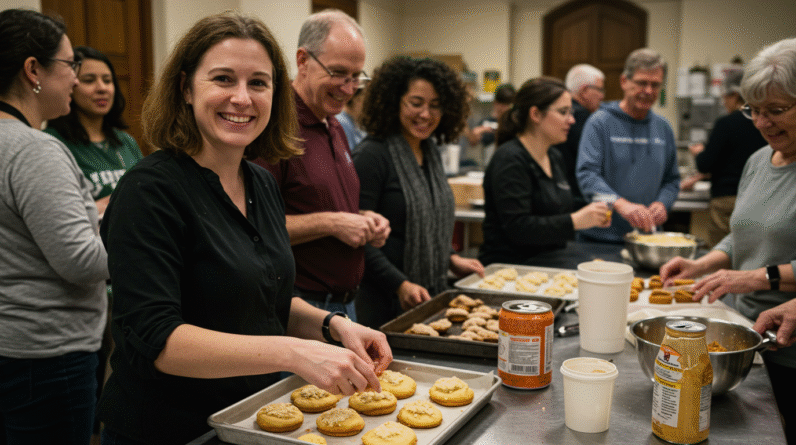Finding Joy In Simple Acts Of Service – Matthew 25:40 In Action
You want your faith to matter in practical ways. You want to know that the small things you do — the cup of water, the quiet prayer, the listening ear — actually count for something in God’s economy. Matthew 25:40 captures this truth powerfully: when you serve the least of these, you serve Jesus. Understanding this changes how you live day-to-day and helps you discover real, lasting joy. Read Matthew 25:40 here: Matthew 25:40.
Why a single verse matters for everyday living
A single verse can light up your whole life if you let it. Matthew 25:40 is one of those verses that shifts your spiritual GPS — it moves faith out of private piety and into public compassion. When you internalize this promise, you stop waiting for grand opportunities and begin to see God’s appointments all around you. That matters because God often uses small hands and willing hearts to accomplish great things.
Reading the verse with fresh eyes
When Jesus says, “Whatever you did for one of the least of these brothers and sisters of mine, you did for me,” He invites you into a lifestyle, not just a moment. This verse reframes service as worship. You can read it at Matthew 25:40. Think about the ordinary opportunities you pass every day: the neighbor who needs a ride, the coworker with a hard week, the parent holding a crying baby. Each is a chance to serve Christ directly.
Small actions, big eternal significance
You don’t have to be famous or wealthy to make an eternal difference. The Bible repeatedly affirms that God notices simple kindnesses. For example, Jesus commended practical care for the hungry and thirsty in Matthew 25:35 — see it here: Matthew 25:35. Those small, often unseen acts matter in His sight. That thought can transform how you approach your day: from duty to delight, from obligation to opportunity.
The theology behind simple service
Understanding why small acts matter starts with who God is. He is a God of detail, a God who cares about the lowly and notices the overlooked. The Bible teaches that your compassionate acts are expressions of Christ’s love through you. Consider the apostle Paul’s call to do good at every opportunity in Galatians 6:9-10: Galatians 6:9-10. This encourages you not to grow weary but to keep serving, because what you do matters beyond what you can see.
God’s bookkeeping of good deeds
Hebrews gives another encouragement: God remembers and rewards faithful deeds, even those done in weakness or secrecy. Read it here: Hebrews 6:10. That means when you offer a warm blanket, a listening ear, or a simple prayer, you’re not wasting your time. God sees and keeps an account of love that’s expressed in action.
Joy emerges when service becomes personal
You may think service is about sacrifice and loss. While it can involve giving up comforts, service actually makes you more of who God created you to be. When you move toward people with compassion, you experience a deep satisfaction that outlasts any fleeting pleasure. This is what Scripture means when it talks about the blessing of giving: Proverbs tells you that generosity is noticed by God — see Proverbs 19:17. That’s a spiritual principle you can bank on: serving others feeds your soul.
The unexpected happiness of helping
Your joy isn’t dependent on applause. Often, the most meaningful rewards are internal — peace, contentment, and a deeper sense of purpose. Acts that might seem insignificant to the world are often exactly the ones God uses to grow your character and draw you closer to Him. When you serve, you align with Christ’s heart, and that alignment brings joy that sticks.
Practical ways to practice Matthew 25:40 daily
You don’t need a special title to serve. Begin where you are. Look for practical, sustainable ways to help people in your regular rhythm of life. Simple acts are powerful because they’re repeatable and personalized. Start small so you can keep going.
Simple, practical examples
- Offer a meal to a grieving family or a new mom.
- Sit with the elderly at your church or community center.
- Bring water or blankets to someone waiting outside.
- Notice coworkers who are overwhelmed and offer to help finish a task.
Each of these acts is a way to live out Matthew 25:40. Even the smallest kindness can change someone’s day, and that ripple effect often multiplies in unexpected ways.

How serving others changes your relationships
Serving breaks down walls. When you give of your time and attention, you show that you see people as image-bearers of God. That kind of respect opens conversations, heals wounds, and builds trust. Serving others can transform your family life, your church, and your neighborhood.
Serving equips you for real community
Community isn’t about perfection; it’s about presence. You don’t need to fix every problem to serve; you simply need to be present. Acts of service create a culture where people feel safe to struggle and honest enough to heal. When you practice hospitality and practical help, you model Christ’s love in ways that are tangible and sustainable.
The intersection of humility and service
Serving with humility means you aren’t keeping score. You don’t serve to get credit; you serve because you were served first. Jesus modeled this in a simple way when He washed His disciples’ feet — read John 13:14-15 here: John 13:14-15. That humility turns service from performance to worship. When you serve humbly, you preserve the purity of your motives and allow God to work through you without your ego getting in the way.
Avoiding pride in your good deeds
It’s easy to let good deeds inflate pride. The remedy is to keep returning to gratitude. Remember whose work it is and whose love you represent. Pray before you serve, and ask God to keep your motives clean. Then let the act be between you and God. The reward that matters most isn’t recognition — it’s His approval, as Hebrews reminds you: Hebrews 6:10.
Service as spiritual discipline
Serving is not just an occasional act; it can be a spiritual discipline that forms you. When you make service a habit, it shapes your desires and trains your heart. Like prayer and Scripture reading, regular acts of service create spiritual muscle.
How to build the habit of serving
Create predictable rhythms. You might set aside a morning each month to serve at a shelter, or commit to one intentional help each week. Keep it simple and realistic. Consistency matters more than intensity. Remember Galatians’ encouragement to persist: Galatians 6:9-10. Over time, these small, faithful acts will develop into a ministry of presence that defines your life.
Joy in serving others: how it looks in real life
When you serve faithfully, you’ll notice a growing sense of joy. It’s not celebrity-level excitement — it’s a deep delight that comes from aligning with Christ’s mission. This joy sustains you through difficult seasons and adds meaning to ordinary routines.
(Keyword placement 1) You will discover joy in serving others when you stop thinking of service as a task and start seeing it as your calling. That shift changes everything about how you use your time, your resources, and your relationships.
Stories that shape your heart
Stories are powerful teachers. Think about the widow who quietly gives, the teenager who brings groceries to an elderly neighbor, or the nurse who holds a hand through the night. These simple narratives reflect the Gospel at work. Jesus commends such acts as if they were done to Him — see Matthew 25:40. When you tell and reflect on these stories, your heart becomes more sensitive to God’s opportunities around you.
Overcoming barriers to serving
You might have good reasons for not serving right now: lack of time, fear, or the thought that your efforts won’t matter. Those are real challenges, but Scripture and experience show you can work through them. Proverbs reminds you that small kindnesses are seen by God: Proverbs 19:17.
Practical ways to beat common excuses
- Time: Start with five minutes a day. Tiny habits compound.
- Fear: Serve alongside someone else until you gain confidence.
- Insignificance: Remember that God values the heart behind the act.
When you move past excuses, you find rhythm and renewal. And (Keyword placement 2) joy in serving others grows as you see how even tiny gestures produce fruit.
Serving in the church and outside the church
You can choose to serve within your church or in the wider community. Both matter. Churches organize efforts, resources, and relationships, while community service brings the Gospel into everyday life. Your gifts and availability will guide where you serve best.
Coordinating with others for greater impact
Working with others amplifies what you can do. Teamwork helps you handle bigger needs and sustain service over time. Paul’s instruction about doing good when you can is helpful: Galatians 6:9-10. When you join a team, you multiply your reach and increase your opportunities to experience (Keyword placement 3) joy in serving others.
Serving with wisdom and boundaries
Service without boundaries can lead to burnout. Wisdom helps you serve long-term and protects your family and spiritual health. Colossians gives an important perspective: do everything as unto the Lord, not for people’s approval — read Colossians 3:23-24. When your service is rooted in worship and balanced with rest, it’s sustainable.
Setting healthy limits
- Protect family time so service doesn’t steal what matters most.
- Say “no” when you can’t give genuinely.
- Delegate or partner with others when the need exceeds what you can do.
Boundaries are not selfish; they are stewardship. They keep your offering healthy, which increases the chance that your service will be a source of life rather than depletion.

The reward of service — both now and forever
Christian service has two dimensions of reward. There’s the present blessing: deeper relationships, spiritual growth, and inner joy. And there’s the eternal perspective: God sees and rewards faithful service. The Scriptures encourage you to keep serving because the payoff is real: Acts emphasizes the blessing of giving — see Acts 20:35. You can trust that your acts of kindness are not wasted.
The posture of thankfulness
When you serve expecting nothing in return, you’re practicing kingdom living. Gratitude keeps your heart soft and your motives pure. Remember Mark’s reminder that even small acts done in Jesus’ name are significant: Mark 9:41. That truth helps you hold your good works with open hands, celebrating God’s use of them.
Practical plan you can follow this week
To make Matthew 25:40 practical, create a short plan you can follow this week. Small steps build confidence and create momentum. Choose one or two actions and commit to doing them consistently. This isn’t about grand gestures; it’s about faithful, ordinary love.
A simple seven-day starter plan
- Day 1: Notice and pray for one person who’s struggling.
- Day 2: Send a text of encouragement to someone.
- Day 3: Bring a meal or a coffee to a neighbor.
- Day 4: Volunteer for an hour at a local charity.
- Day 5: Listen without offering solutions to someone who needs it.
- Day 6: Give a small gift or card to someone who works hard and goes unnoticed.
- Day 7: Reflect and journal how serving affected you.
As you practice, you’ll see the pattern of blessing. And you’ll begin to taste (Keyword placement 4) joy in serving others in everyday life.
When service feels heavy: what to do
There will be times when serving feels like hard work. That’s normal. In those seasons, return to Scripture and your core motivations. Hebrews reminds you God sees your work and the love you show in His name: Hebrews 6:10. Let that reality sustain you.
Renewal through rest and fellowship
If you’re weary, take spiritual rest. Spend time in God’s presence and in Christian community. Allow others to serve you too. Serving is sustainable when it’s mutual; when you receive as well as give, your tank gets refilled. That balance helps you keep experiencing (Keyword placement 5) joy in serving others without losing yourself.
Teaching the next generation to serve
You can model service to the people around you, especially kids. Children learn by watching. When they see adults serve with humility and joy, they internalize those values. Practical examples and shared service projects create lifelong habits.
Simple family practices
- Serve together once a month at a local shelter or soup kitchen.
- Encourage children to give a portion of their allowance.
- Share stories of how small acts made a difference.
These practices pass down a legacy of compassion and create environments where (Keyword placement 6) joy in serving others becomes normal, not exceptional.
The ultimate motivation: serving Jesus
Remember why you serve. You serve because Jesus served you first. Service is a response to grace. Matthew 25:40 makes this plain — serving the vulnerable is serving Christ himself. Read it again here: Matthew 25:40. Keep coming back to that truth when your energy is low or your motives blur.
Living for an audience of One
When you live to please God rather than people, your service becomes free — free from the need for recognition, free from comparison, and filled with purpose. Luke’s promise about giving is part of that picture: Luke 6:38. God’s economy rewards generosity in ways that matter most.
(Keyword placement 7) Ultimately, your experience of joy in serving others is rooted in knowing you’re doing what Jesus asked — caring for the least because you love Him.
Closing encouragement
You don’t have to wait for the perfect moment to begin. Start where you are, with what you have. Remember that God notices the small things. When you act in love, you reflect Jesus to a watching world. Keep serving faithfully, and you’ll find your life fuller, your faith deeper, and your joy more abiding.
Explore More
For further reading and encouragement, check out these posts:
👉 7 Bible Verses About Faith in Hard Times
👉 Job’s Faith: What We Can Learn From His Trials
👉 How To Trust God When Everything Falls Apart
👉 Why God Allows Suffering – A Biblical Perspective
👉 Faith Over Fear: How To Stand Strong In Uncertain Seasons
👉 How To Encourage Someone Struggling With Their Faith
👉 5 Prayers for Strength When You’re Feeling Weak

📘 Jesus and the Woman Caught in Adultery – Grace and Mercy Over Judgement
A powerful retelling of John 8:1-11. This book brings to life the depth of forgiveness, mercy, and God’s unwavering love.
👉 Check it now on Amazon
As a ClickBank Affiliate, I earn from qualifying purchases.
Acknowledgment: All Bible verses referenced in this article were accessed via Bible Gateway (or Bible Hub).
“Want to explore more? Check out our latest post on Why Jesus? and discover the life-changing truth of the Gospel!”








